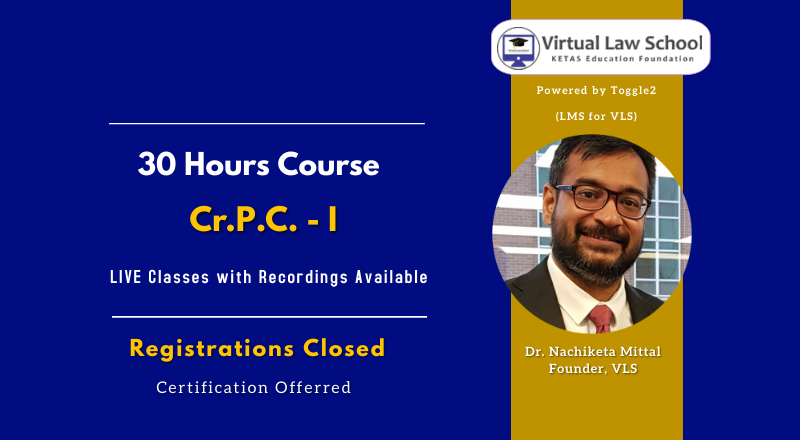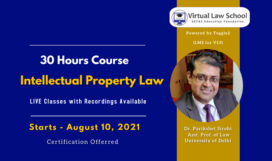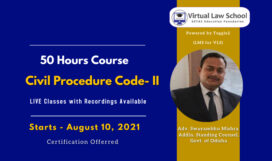Code of Criminal Procedure- I (30 Hours)

Read Payment Instructions below before making the purchase
INTRODUCTION
Law and coherent social order are an indispensable part of every civilized and democratic society. Criminal law serves the task of defining delinquent human behavior and laying down its essential elements. The substantive criminal law cannot achieve its objectives without the support of the Code of Criminal Procedure which provides the apparatus that would ensure the maintenance of social order that is just, fair and equitable to all. Code of Criminal Procedure provides the registration of a criminal offence. The investigation scheme and various functionaries are being identified with their respective roles in the scheme of Cr.P.C. More so, this branch of law operationalizes the substantive criminal law by providing for schematic criminal trial including stages wherein evidence should be lead. Remarkably, we have also seen recent amendments in the criminal procedure law in line with the rights of arrested persons, female accused persons, etc.
Course on Cr.P.C. is one of the very significant courses for a law student from the law school examination as well as practice point of view. Welcome to the exciting world of criminal investigation and trial.
LEARNING OBJECTIVES
- To inculcate the skill of reading the inter-linked Code of Criminal Procedure with due reference to the Indian Penal Code, Law of Evidence and the Constitutional mandate.
- To identify the fundamental policy choices incorporated in the Code of Criminal Procedure.
- To analyze the interpretations of criminal procedures offered by the Apex Court in India.
- To analyze how far the fundamental policy choices laid down in the Code of Criminal Procedure practiced in reality.
- To articulate opinions on significant, vital, controversial and current issues involved in the practice of criminal law.
Payment Instructions:
- Click the Get Course Button
- Check Out Page will Open
- Verify the Courses selected by you
- You will see two Payment Options. Offline Payment using UPI Code (mentioned there) Or Wire Transfer (Internet Banking Details)- Pay using any Payment option
- Finally- Click Purchase
- We will verify the payment received & confirm your purchase
- Check ‘My Orders’ and you will be able to access your course.
- Hurray! It’s Done- Join us soon 🙂
- Call us or Whatsapp at +91-70416-32600, if you face any problem.
- Models of criminal justice
- Adversarial justice system vs inquisitorial justice system
- How procedural law brings substantive criminal law into action
- Principles of natural justice
- Constitution of criminal courts
- Hierarchy of criminal courts
- Role of police
- Appointment of public prosecutors
- Role of defense lawyers.
- Bailable and non-bailable offences
- Compoundable and non-compoundable offences
- Cognizable and non-cognizable offences
- Complaint and complaint case
- First Schedule of Cr.P.C.
- Other key terms and concepts
- Filing of First Information Report
- Police powers of investigation
- Statements given in police custody
- Search and seizure
- Inquest report
- Chargesheet and its facets
- Landmark Judgements on Investigation including further and fresh investigation
- Circumstances under which police enjoys power to arrest a person
- Positive obligations casted on police under the law and series of landmark judgements of the Supreme Court
- Amendments made in Cr.P.C. in relevant sections concerning arrest
- How arrest can be made?
- What are the guidelines of the Supreme Court to be followed during the arrest?
- Recent developments and controversies concerning the arrest.
- Difference between police and judicial remand
- How and when the arrested persons are sent into judicial custody
- Right to bail when investigation cannot be completed within 24 hours and right to bail under Sec. 167 of Cr.P.C
- Medical examination of the arrested person during police remand, its necessity and justification.
- Principles relating to appropriate court to inquire into or try an offence.
- Which police station will be relevant for investigating into an offence in terms of local jurisdiction.
- Understanding of the concept of cognizance
- Cognizance taken by Magistrates & Court of Sessions
- Limitations on the power to take cognizance
- Transfer of cases after taking cognizance
- Issuance of process
- How irregularities in court proceedings
- Sec. 460 and 461 relating to irregularities which may or may not vitiate proceedings
The course commenced in March. Interested candidates can join & access the previously recorded session. Doubt clearance sessions shall be conducted (if required & requested).







